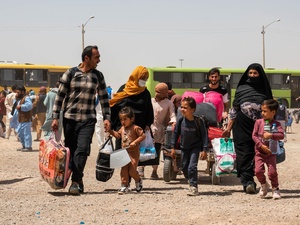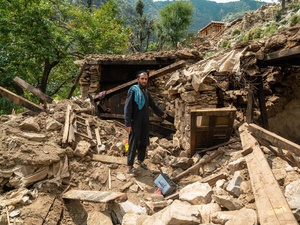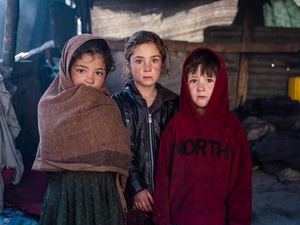Half million Afghan returnees face urgent needs at home
Half million Afghan returnees face urgent needs at home

A daunting task to rebuild homes in Sayghan village.
KABUL, Afghanistan, May 8 (UNHCR) - The UN refugee agency intensified calls for aid to Afghanistan on Wednesday as the number of Afghan returnees crossed 500,000 just nine weeks after UNHCR started helping them homewards from neighbouring countries.
"Afghans uprooted for decades are showing the world how confident they are about the future of their country," said Filippo Grandi, UNHCR's chief of mission in Afghanistan. "But there is little to sustain that confidence when they get back to their villages."
In addition to the half million refugees already back from Pakistan, Iran and the Central Asian states, more than 150,000 internally displaced persons (IDPs) have gone back to their villages. This amounts to more than 650,000 returnees, or over 54 percent of the UNHCR's goal for 2002. The refugee agency plans to help 1.25 million Afghans go home this year.
"Many Afghans are returning home with next to nothing," said UN High Commissioner for Refugees Ruud Lubbers, who is currently in New York for meetings at the United Nations. "Donors must ensure that the massive repatriation underway is sustainable for the long term. That means that rehabilitation and development aid must reach rural towns and villages immediately."
Pressure is building on the Afghan Interim Authority and humanitarian agencies to keep pace with the expectations of the war-weary Afghan people.
"It is urgent that the Afghan Interim Authority is supported and that development projects get underway so that the Afghan people see that the central government is delivering services and that donor aid is trickling down," said Lubbers.
Grandi agreed: "The returnees - both refugees and those internally displaced - cannot wait for ideal conditions to take hold - something that donors seem to be waiting for. We do not have that luxury. Aid agencies need resources now."
UNHCR is currently spending $23.5 million to purchase beams and other shelter materials for distribution to returnees who need to rebuild their homes. Afghans already receive plastic tarpaulin or tents upon their return, but many people across the war-ravaged country need to reconstruct their homes, particularly the more than half million returnees who have long been out of the country.
The UN refugee agency is funding various projects throughout Afghanistan to provide protection and assist the reintegration of 1.25 million planned returnees this year, as well as to assist some 3 million Afghan refugees in neighbouring states.
Of the $271 million UNHCR needs over the 15 months ending in December 2002, only $171 million has been received. The operation costs more than $20 million a month.
In addition, the refugee agency is also pitching in to maintain the pace of returns as other aid agencies face funding problems.
Some 150,000 displaced Afghans in Kabul were scheduled to start returning to their villages last week, but their movement was delayed as the International Organization for Migration (IOM) ran out of money. At a press briefing on Tuesday, UNHCR spokesman Peter Kessler said the refugee agency is looking to provide travel grants to help them start their journey home.
He added that the UNHCR will also take on the transport of returnees from Iran onwards from Herat, which IOM has temporarily halted, likely in the form of an increased travel grant.
UNHCR is currently helping 17,000 displaced Afghans to return home from the Hesar Shahi camp near Jalalabad in an operation that has already seen more than 10,000 IDPs go back.









